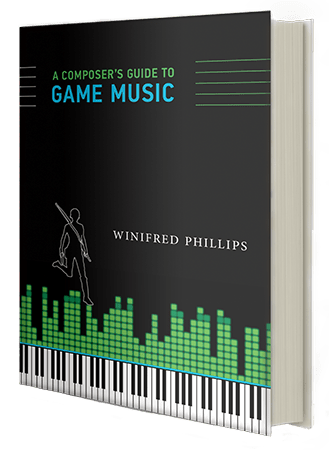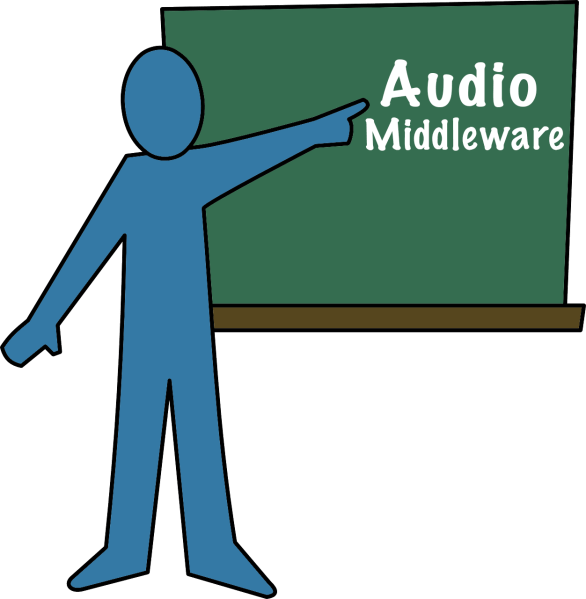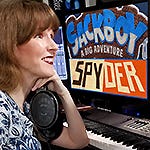
Featured Blog | This community-written post highlights the best of what the game industry has to offer. Read more like it on the Game Developer Blogs or learn how to Submit Your Own Blog Post
Video game music composer: Getting your big break (2020 edition)
Game composer Winifred Phillips discusses ways for new composers to get their first game gig. Includes advice on the effectiveness of demo reels and networking, a discussion of middleware, music genre specialization, and a list of online resources.


By Winifred Phillips | Contact | Follow
Hey everyone! I'm video game composer Winifred Phillips. In the photo above I'm working on the project that launched my career as a game composer - God of War. Starting a viable career in the game development industry as a composer can be an awesome task, and I'm often asked for advice about how to break into this business. So each year I revisit the subject in an article that allows us to consider current ideas and strategies. Along the way, we contemplate multiple viewpoints, both from expert music and game audio practitioners and by anonymous game audio folks in community forums.  This can be helpful, because the common wisdom on this subject changes in subtle but appreciable ways with each passing year. By revisiting the topic periodically, I hope that we'll be able to obtain a deeper understanding of what it takes to land the coveted first gig as a composer of music for games.
This can be helpful, because the common wisdom on this subject changes in subtle but appreciable ways with each passing year. By revisiting the topic periodically, I hope that we'll be able to obtain a deeper understanding of what it takes to land the coveted first gig as a composer of music for games.
Part of the reason I write this article each year is personal. My own "big break" story is so extraordinarily unusual that it can't provide much useful guidance for newcomers. Being fortunate enough to have a famous game like God of War as your first game credit isn't the typical entry path for a budding video game composer. Yet, because I'm a fairly visible member of the game audio community who has written a book called A Composer's Guide to Game Music (pictured), I'm constantly asked for advice by aspiring composers who want to start their professional careers and are having trouble getting out of the gate. Since my own story is such a 'bolt-of-lightning' case study, I think it's useful for us to study the more traditional entry paths when we're trying to understand how aspiring game composers can get their start. By the way, in case you're wondering, here's the story of how I landed my first gig - I told the story during a Society of Composers and Lyricists event in NYC, and it's captured in this video:
A List of Strategies
Okay, before we launch into a discussion of strategies for aspiring game composers, I'd like to recommend that everyone watch the following video produced by Christian Henson. This video from June of 2019 is an excellent discussion of the top ten strategies to succeed as a media composer:
So as you can see, Henson provides an appraisal of the uphill battle facing an aspiring media composer. From that perspective, let's now branch out and discuss the efficacy of some widely-touted strategies for breaking into the game industry.
Strategy #1: Will a great demo reel open doors?
 In last year's article, we discussed music demo reels at length. Over the years, music demo reels have been viewed as a crucial tool that aspiring composers can use to attract potential clients. But do they actually function as intended? Do killer demo reels land gigs?
In last year's article, we discussed music demo reels at length. Over the years, music demo reels have been viewed as a crucial tool that aspiring composers can use to attract potential clients. But do they actually function as intended? Do killer demo reels land gigs?
In his blog, composer Ryan Ike shares an early experience of networking during the PAX video game conference. "When I was first starting out, I walked around PAX shakily thrusting my business card into people's hands and handing out hastily printed demos of my work," he writes, "and literally every single dev who didn’t just put them in the trash right in front of me while making direct eye contact is a goddamned hero."
So, if music demos are often treated like trash, are we wasting our time with them? Not if we're realistic about what a music demo is meant to actually demonstrate. "The only purpose of a demo reel is to prove to a prospective client that you’re musically competent," writes Matt Kenyon in his article for ComposerCode.com. "That’s it. It doesn’t say anything about your communication skills, how quickly you’ll deliver what you promise, or if you’re easy to work with."
If professionalism and personality are such crucial factors, then should we stop placing as much emphasis on our music demos? Instead of featuring our demo reels as the central component of our job pitches, Ryan Ike suggests that we should offer them more casually, making them available online for prospective clients to access if they're interested. "Make sure you have your absolute best work available online," Ike advises. "This can be a demo reel on your website, a YouTube playlist, a link to your Bandcamp, etc. I myself simply curate the Spotlight section on my SoundCloud to show the best balance between my most recent and best work."
With this more casual approach in mind, we should also be careful to keep our expectations in check. Matt Kenyon writes, "I haven’t talked to many video game composers that said their demo reel was the deciding factor that got them hired."
All right, so if we accept that demo reels are not the best way to get our first job, then should we focus more on those other qualities that Kenyon mentioned? Our communication skills, our personalities... our ability to make friends?
Strategy #2: Can we network our way to our first gig?
 We hear this advice all the time, especially on bulletin boards and in forums. "It's a networking game for sure and although it's now violently competitive, you can find paying work and have a ton of fun," says Tonejunkee at the GearSluts Forums. "Start advertising yourself out and going to local video game dev meet ups and introduce yourself to everyone from the bedroom dev to the CEO of AAA companies," says Wheeler_Sound on the GameAudio SubReddit.
We hear this advice all the time, especially on bulletin boards and in forums. "It's a networking game for sure and although it's now violently competitive, you can find paying work and have a ton of fun," says Tonejunkee at the GearSluts Forums. "Start advertising yourself out and going to local video game dev meet ups and introduce yourself to everyone from the bedroom dev to the CEO of AAA companies," says Wheeler_Sound on the GameAudio SubReddit.
In-person typically networking receives a lot of emphasis in these discussions. Matt Kenyon of ComposerCode.com agrees. "The best way I’ve found to meet other game audio creatives is through game development meetups, which can be found via Meetup.com. Bonus points if your city offers any sort of game jam. That’s the perfect place to meet both developers and fellow composers."
But there is a definite down-side to the in-person networking approach. "You should network as much as possible but you need to be aware of the costs," writes mattesque on the Game Audio SubReddit. In a discussion regarding the benefits and drawbacks of attending a game industry conference, mattesque offers the following viewpoint. "Have you shipped any games? If you haven't you might not get the most out of the conference. So maybe wait till you've got some games under your belt," mattesque advises. "You'll be networking against lots of other people who have shipped stuff. So again, might be a long term investment."
On the other hand, Aaronisafalcomain proposes a strategy in the same Reddit discussion that could give an enterprising composer an advantage. "You need to be extremely efficient with your time and make sure you follow up with every single person you make a meaningful interaction with. Everyone at the conference meets and talks to hundreds of people. They will likely forget about you unless you follow up. The good thing is most people don’t follow up so if you do, you’re lookin good."
 Finally, mattesque offers a word of warning. "Getting in to game audio is very very hard. There is a lot of people wanting to do it. I know, sadly, a lot of really talented people that haven't made it through no fault of their own," mattesque says. "The more you can do with no to little cash outlay the possible better off you will be."
Finally, mattesque offers a word of warning. "Getting in to game audio is very very hard. There is a lot of people wanting to do it. I know, sadly, a lot of really talented people that haven't made it through no fault of their own," mattesque says. "The more you can do with no to little cash outlay the possible better off you will be."
Finally, in an article for Music Connection Magazine, Chris Lines suggests that online networking can be highly effective. "It’s hard work in the trenches––you have to get out there and HUSTLE! Pitch game developers all the time, and not just anybody––actually spend the time researching the games you like. You’ll need to do it a lot; I have Excel files hundreds and hundreds of lines long with developers I’ve contacted. Most came to nothing, but some did! There is a silver lining to this approach too, the more potential clients you have, the less precious you will get about their replies."
Strategy #3: Can our tech knowledge get us our big break?
This idea has been spreading throughout the industry for a few years now. "The middleware tools are now a desired skill and can actually lead to full time gigs," asserts Tonejunkee on the GearSlutz forums. "Learn FMOD, WWise, UNITY, and UNREAL. Create demo projects from FMOD and Wwise," advises Wheeler_Sound on the GameAudio SubReddit.
 Is this a viable career-launching strategy? Do we need to become an expert in the software implementation tools in order to land that coveted first job? Well, it's certainly an idea that's growing in popularity. "If you're fortunate enough to be working with an experienced game developer who knows how to program audio, you may only need to send them tracks to be incorporated into the game," writes Dante Fumo of Reverb.com. "However, if you're working with people who don't know their way around the audio side of things—or if you just want more control—you may need to dig in and do it yourself."
Is this a viable career-launching strategy? Do we need to become an expert in the software implementation tools in order to land that coveted first job? Well, it's certainly an idea that's growing in popularity. "If you're fortunate enough to be working with an experienced game developer who knows how to program audio, you may only need to send them tracks to be incorporated into the game," writes Dante Fumo of Reverb.com. "However, if you're working with people who don't know their way around the audio side of things—or if you just want more control—you may need to dig in and do it yourself."
In his article for Music Connection Magazine, Chris Lines offers an interesting perspective on the subject. "I see it a lot online, where composers are so worried about getting their knowledge or skills up to scratch, they won’t dare throw their hat into the ring until they are “ready."  Yes, we all know video games can sometimes use complex music systems, but you don’t need to know all this stuff on day one. There are plenty of small games out there being made which will need little more than a few looping tracks. The chances of you landing your first gig and having to work on a complex audio system are pretty small. And guess what, if you do somehow land a job scoring the next Batman, you can stay up for a week or two and learn the damn software you don’t yet know."
Yes, we all know video games can sometimes use complex music systems, but you don’t need to know all this stuff on day one. There are plenty of small games out there being made which will need little more than a few looping tracks. The chances of you landing your first gig and having to work on a complex audio system are pretty small. And guess what, if you do somehow land a job scoring the next Batman, you can stay up for a week or two and learn the damn software you don’t yet know."
Considering for a moment that technical knowledge might not be the most advantageous way for us to distinguish ourselves - what other strategies can help us stand out from the crowd?
Strategy #4: Can specialization be our ticket to success?
In his video enumerating strategies for making a career as a media composer, Christian Henson emphasizes the importance of making your presence felt in the industry. "Be there, be seen and then get online. Get to work. Get to work creating your brand, your online presence, what you stand for, your aesthetic, your heritage," says Henson. "Continue to develop your own personal heritage. This is the thing that sets us aside from each other: our own taste fingerprint, the stuff that we have absorbed since we were born. Continue to invest in that," Henson urges. "Your own unique DNA strand of inspiration! Play to your strengths! I know it's very easy to say 'discover your voice, be individual, be original!' These are kind of abstract and incredibly difficult concepts to understand and objectives to achieve. But if you play to your unique combination of strengths - whether that be interpersonal, technical, your taste, your heritage," Henson observes, "its likely that that will deliver to the world something totally unique. Something totally you."
 In other words, Henson is talking about the importance to specialize in a particular set of skills and characteristics that will become your personal brand in the industry. These will likely include a particular musical style that will become associated with your name, and will define your career. While the desire for originality is universal and important, the translation of this uniqueness into a career-defining brand is the definition of specialization. Common wisdom has long supported the importance of specialization for composers. But is it absolutely necessary for us to define a particular specialty and stick to that brand?
In other words, Henson is talking about the importance to specialize in a particular set of skills and characteristics that will become your personal brand in the industry. These will likely include a particular musical style that will become associated with your name, and will define your career. While the desire for originality is universal and important, the translation of this uniqueness into a career-defining brand is the definition of specialization. Common wisdom has long supported the importance of specialization for composers. But is it absolutely necessary for us to define a particular specialty and stick to that brand?
Writing for Reverb.com, Dante Fumo touches upon the concept of specialization while urging aspiring composers to experiment with different styles in their early careers. "A great way to level up your skills is to build up a demo reel or re-score cinematics from your favorite games," Fumo writes. "This will allow you to freely experiment in different genres like chiptune, orchestral music, or creepy horror scores until you find your voice." So in this quote, Fumo is suggesting that a young composer can branch out and experiment before developing their own musical specialization.
 Going a step further, Chris Lines asserts that such experimentation is critical for a young composer's early success. "Don’t default to one style of music. This will differ depending on your musical path so far, but getting a gig scoring a game when you are brand-new is hard enough. I would argue that you are limiting your chances even more if you are going to say you will only write in a specific genre. You don’t need to be able to write in every conceivable style, but try out a few styles you wouldn’t normally write in. Apart from giving you the experience, you will also then have a starting palette of sounds for that genre should you be asked."
Going a step further, Chris Lines asserts that such experimentation is critical for a young composer's early success. "Don’t default to one style of music. This will differ depending on your musical path so far, but getting a gig scoring a game when you are brand-new is hard enough. I would argue that you are limiting your chances even more if you are going to say you will only write in a specific genre. You don’t need to be able to write in every conceivable style, but try out a few styles you wouldn’t normally write in. Apart from giving you the experience, you will also then have a starting palette of sounds for that genre should you be asked."
The choice to specialize is doubtless a very personal and complicated decision. Let's now look at the last strategy for newcomers - which may be the most complicated decision of all.
Strategy #5: Should we work for free?
This is perhaps the most controversial tactic for an aspiring composer. Some advocate it, some oppose it. I'll just present the two viewpoints here, with the suggestion that each aspiring composer give the matter serious consideration and make the choice that sits most comfortably  with them.
with them.
Christian Henson articulates the supporting view in his video essay. "They say the meek shall inherit the earth," Henson says, "and I think nine times out of ten this really does suit being a media composer. We are in shackles and chains to the great picture up on the screen: the  dialogue that's coming out of that center speaker. So to be meek, to appear to be hungry for knowledge, to learn, to help, is a great way of approaching people and offering up your services - at first for free."
dialogue that's coming out of that center speaker. So to be meek, to appear to be hungry for knowledge, to learn, to help, is a great way of approaching people and offering up your services - at first for free."
On the opposite side of the issue, Nathan Madsen (moderator of the GameDev.net forum) offers this viewpoint. "I personally only advocate working for free on hobby projects. I don't like seeing young(er) composers and sound designers working for free on commercial projects simply because they're young and/or inexperienced. So my personal mantra is if no one gets paid - work for free. If someone gets paid, everyone should get paid."
Conclusion
Before ending this article, let me leave you with a thought about what it means to be an aspiring video game composer. Everything we've discussed up to this point has been focused on overcoming the obstacles imposed by inexperience, transcending the curse of being an unknown commodity, and finally reaching the goal of becoming an attractive resource. But being unknown and inexperienced doesn't have to be a curse. If the industry doesn't know about the inexperience, then there's no reason to tell anyone about it, as Matt Kenyon of ComposerCode.com explains. "Do not, under any circumstances, think of yourself, advertise yourself, or brand yourself as an “aspiring” composer," writes Kenyon. "If you’ve composed anything, you are a composer."
The List
Last but not least, here's the full list of links to resources that may help a newcomer trying to break into the business. Some of these links were the source of the quotes we discussed earlier in this article. The rest come from articles on this topic that I've written in previous years.
Resources from the past year
Film, TV, Games Composer - 10 Strategies To Succeed
by Christian Henson, YouTube
Don't D-I-E at GDC: Getting the Most Out of the Game Developers Conference
by Ryan Ike
Planning my game-audio education
Music for Games Forum, GearSlutz.com
Getting Started
GameAudio SubReddit
About the upcoming GDC 2020 SF
GameAudio SubReddit
MUSIC INDUSTRY TIPS: DO'S AND DON'TS OF BREAKING INTO VIDEO GAME MUSIC
by Chris Lines, Music Connection Magazine
6 Skills You Need to Compose Video Game Soundtracks, According to the Pros
by Dante Fumo, Reverb.com
Game Audio Industry Survey 2019
by GameSoundCon
How to get into music/audio
Music and Sound FX Forum, GameDev.net
Archived Resources
GDC 2018: Audio Bootcamp XVII: Reel Talk
by Matthew Marteinsson and Kevin Regamey, GDCVault.com
(Subscription required for access)
Yet Another Game Audio Hiring Article
by Ariel Gross, Gamasutra.com
Preparing a Professional-Looking Portfolio - A Composer's Guide
by Daniel Spreadbury, Blog.Dorico.com
The Game Audio Career
by Nathan Madsen, GameAudio101.com
How can I start my career in video game audio?
by Jason W. Bray, GameIndustryCareerGuide.com
Networking at a Game Convention Part 1: The Calm Before the Social Storm
by Rocky Kev, Black Shell Media
Make Some Noise! Getting a Job Creating Sound and Music for Videogames
by Will Morton, Gamasutra.com
How did you get your first job?
GameAudio Reddit Community Discussion
Finding a game industry job - networking and adding value
by Akash Thakkar, YouTube
Getting Started as a Video Game Composer
by Bobby Prince, BPmusic.com
Where does an amateur composer find job, or is he heard?
Northern Sounds community discussion
How to Wrangle a Job Writing Music for Computer Games
by Lance Hayes, Andertons Music Co.
GDC 2011 Talks #1: Tips for Prospective Video Game Composers
by Laura Shigihara, SuperShigi.com
How to get a gig as a Game Music composer
by Brian Schmidt, Sound On Sound
How to be a video game music composer – Tips from the pros
by Sophia Tong, GamesRadar.com
Music in the Gaming Industry – Getting a Job as a Game Composer
by Nelson Everhart, Kingsisle Blog
I want to be a game composer
GameDev.net community discussion
Game Developers and Music Composers – How do you network?
TIGForums community discussion
 Popular music from composer Winifred Phillips' award-winning Assassin's Creed Liberation score is currently being performed live by a top 80-piece orchestra and choir as part of the Assassin's Creed Symphony World Tour, which kicked off in 2019 with its Paris premiere. As an accomplished video game composer, Phillips is best known for composing music for games in five of the most famous and popular franchises in gaming: Assassin’s Creed, God of War, Total War, The Sims, and LittleBigPlanet. Phillips' other notable projects include music for the triple-A first person shooter Homefront: The Revolution (Deep Silver), and numerous virtual reality games from such accomplished developers as Supermassive Games, High Voltage Software, and Armature Studio. She is the author of the award-winning bestseller A COMPOSER'S GUIDE TO GAME MUSIC, published by the MIT Press. As the foremost authority on music for interactive entertainment, Winifred Phillips has given lectures at the Library of Congress in Washington DC, the Society of Composers and Lyricists, the Game Developers Conference, the Audio Engineering Society, and many more. Phillips’ enthusiastic fans showered her with questions during a Reddit Ask-Me-Anything session that went viral, hit the Reddit front page, received 14.9 thousand upvotes, and became one of the most popular gaming AMAs ever hosted on Reddit.
Popular music from composer Winifred Phillips' award-winning Assassin's Creed Liberation score is currently being performed live by a top 80-piece orchestra and choir as part of the Assassin's Creed Symphony World Tour, which kicked off in 2019 with its Paris premiere. As an accomplished video game composer, Phillips is best known for composing music for games in five of the most famous and popular franchises in gaming: Assassin’s Creed, God of War, Total War, The Sims, and LittleBigPlanet. Phillips' other notable projects include music for the triple-A first person shooter Homefront: The Revolution (Deep Silver), and numerous virtual reality games from such accomplished developers as Supermassive Games, High Voltage Software, and Armature Studio. She is the author of the award-winning bestseller A COMPOSER'S GUIDE TO GAME MUSIC, published by the MIT Press. As the foremost authority on music for interactive entertainment, Winifred Phillips has given lectures at the Library of Congress in Washington DC, the Society of Composers and Lyricists, the Game Developers Conference, the Audio Engineering Society, and many more. Phillips’ enthusiastic fans showered her with questions during a Reddit Ask-Me-Anything session that went viral, hit the Reddit front page, received 14.9 thousand upvotes, and became one of the most popular gaming AMAs ever hosted on Reddit.
Follow her on Twitter @winphillips.
Read more about:
Featured BlogsAbout the Author(s)
You May Also Like







.jpeg?width=700&auto=webp&quality=80&disable=upscale)








